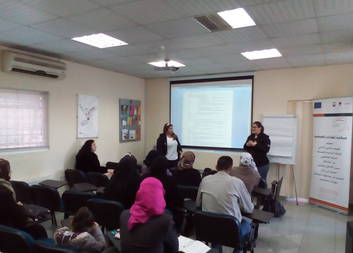Two weeks ago, a training session for refugees from Syria took place in six Jordanian areas. The refugees learned how to work out a business plan and how to set up their own micro-enterprises. By June 2016, it is expected that 150 people will have taken part in the course. So far, the refugees have already participated in programmes regarding the improvement of practical skills.
Through the delivery of these kind of programmes, Caritas CR contributes to the financial independence of refugees, improves their situation and enables them to stay in Jordan. Roughly 10% of the course participants are Jordanians who are also in financial need.
The activities refugees can take part in, include for example, the sale of processed food and other handmade products and petty services in households such as taking care of gardens and babysitting. They can also participate in the production of sanitary napkins or incontinence pads, which will be made by at least two households.
Consequently, each of the 150 participants should be able to earn at least 50 Jordanian dinars per month (about 1,715 CZK), which is an average sum sufficient for food for a five-member family. Nevertheless, in most cases Caritas CR expects income of about 150 dinars or more, which is approximately the minimum wage.
Caritas CR will also provide material support for setting up businesses for successful participants. These could include for example, services for necessary equipment (such as fridges or cookers), tools (shovels, pots, etc.), materials for making the primary products (seedlings, vegetable, fabric), protective equipment (gloves, safety glasses, first aid kits) amidst many more. In some cases, Caritass will also pay the first months’ rent for the starting entrepreneurs or we will help to resettle families in an area where business will be easier.
The activities of Caritas CR were co-financed by Caritas Switzerland and the European Commission.







